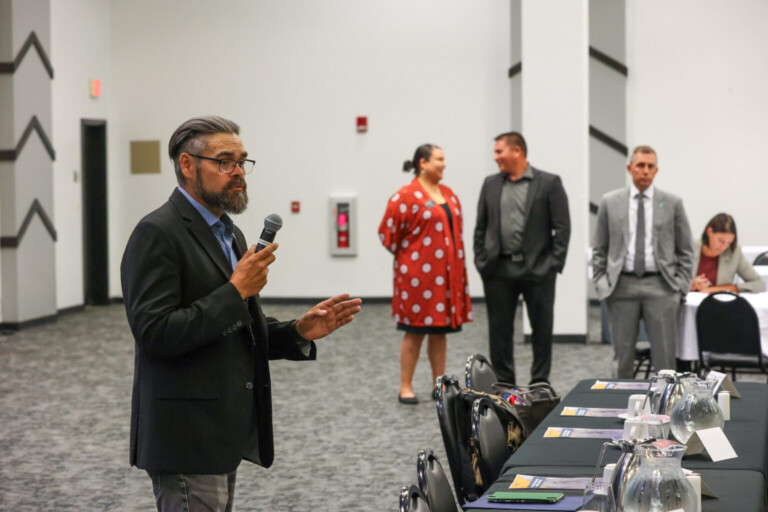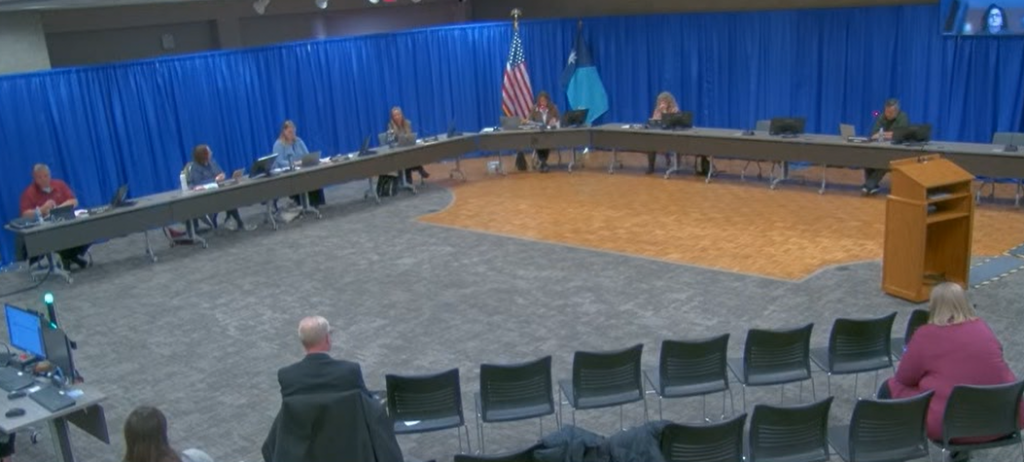US Supreme Court to keep North Dakota district map in place until voting rights case wraps up

BISMARCK, N.D. (North Dakota Monitor) — The U.S. Supreme Court agreed to prolong a temporary freeze on North Dakota’s legislative district map — hinting that the justices may be interested in hearing a tribal voting rights case against the state.
The Supreme Court’s order, issued Thursday, prevents an appellate court’s judgment in a landmark North Dakota redistricting lawsuit from taking effect until the higher court makes a final decision in the case. The suit, filed in 2022 by the Spirit Lake Nation, Turtle Mountain Band of Chippewa and three tribal citizens, accuses a legislative district map adopted by North Dakota lawmakers in 2021 of unlawfully diluting the power of Native American voters.
The judgment would do two things: make it so that private citizens in the 8th Circuit can’t sue under a law that bans racially discriminatory voting practices, and pave the way for North Dakota’s district lines to revert back to the 2021 map.
Now that the Supreme Court has stepped in, voters in the seven 8th Circuit states will still be able to bring lawsuits under the statute, known as Section 2 of the Voting Rights Act, at least until it decides the North Dakota case.
“For decades, Tribes and Native Americans in North Dakota have fought for the rights of reservation voters,” Lenny Powell, a Native American Rights Fund attorney representing the plaintiffs, said in a statement Thursday. “Today is another victory in that fight.”
The order also likely means North Dakota’s district lines will remain the same for the 2026 election cycle. The current map — which puts the Turtle Mountain and Spirit Lake reservations in the same district — was adopted in 2024 after the tribes convinced U.S. District Court Judge Peter Welte that the 2021 map was discriminatory.
The plaintiffs asked the U.S. Supreme Court to freeze the current map in place as they prepare to appeal the 8th Circuit’s decision to the high court. Thursday’s order solidifies a shorter stay on the judgment the Supreme Court issued last week.
“We are relieved that Native voters in North Dakota retain the ability to protect ourselves from discrimination at the polls,” said Jamie Azure, chairman of the Turtle Mountain Band of Chippewa. “Our fight for the rights of our citizens continues.”
Had the Supreme Court allowed the 8th Circuit to proceed with its judgment, three North Dakota lawmakers would change districts: Rep. Collete Brown, D-Warwick, would go from representing District 9 to District 15. Rep. Donna Henderson, R-Calvin, would switch from District 15 to District 9B, while Sen. Kent Weston, R-Sarles, would switch from District 15 to District 9. All three are up for election next year.
Brown is also one of the three tribal citizens who are plaintiffs in the case.
Since the North Dakota constitution requires lawmakers to live in the same district they represent, the judgment could potentially lead to those three lawmakers being unseated, attorneys for the state’s legislative branch have said.
“Today’s ruling helps protect our voice while we continue the fight for Native voting rights and fair representation,” Brown said in a statement on Thursday’s decision.
In court documents arguing against the stay, attorneys representing the state argued the Legislature’s attorneys did not offer convincing evidence the three lawmakers would actually be at risk of losing their seats if the judgment took effect.
Anna Baldwin, a Campaign Legal Center attorney representing the plaintiffs, said that Thursday’s order is “both a strong signal that the court will hear the case and that it is seriously considering reversing the 8th Circuit’s decision.”
The 8th Circuit had found that the Section 2 of the Voting Rights Act — which private plaintiffs had used to bring voting discrimination claims against state governments for decades — may only be enforced by the U.S. Department of Justice. The 8th Circuit is the only one in the country to make this finding.
The plaintiffs say the appellate court misinterpreted the law, and that their findings threaten to take away an important way for citizens to protect their rights.
“We view this as the first step of the Supreme Court correcting the really grievous error that the 8th Circuit made here,” Baldwin said.
If the Supreme Court does take the case, oral arguments would likely take place sometime next year, they added.
North Dakota Attorney General Drew Wrigley in a Thursday presentation to Bismarck and Mandan’s bar association also said he thinks there is a “very real chance” the U.S. Supreme Court will agree to review the case. He said he believes the lawsuit will ultimately come out in North Dakota’s favor.
Attorneys for North Dakota earlier this week said that the court should honor the 8th Circuit’s decision. In a Tuesday filing, they said private plaintiffs should not be able to use lawsuits to upend the redistricting process.
The tribes have until early October to file their formal petition asking the Supreme Court to hear the lawsuit.
If the court denies their petition before the end of the year — thereby affirming the 8th Circuit’s ruling — North Dakota could end up with the 2021 district map for the 2026 election. That’s because the state has until Dec. 31 to finalize its district lines for the upcoming election cycle.
The order indicates that Chief Justice John Roberts and justices Sonia Sotomayor, Elena Kagan, Ketanji Brown Jackson, Amy Coney Barrett and Brett Kavanaugh voted in favor of the stay.
It says justices Clarence Thomas, Samuel Alito and Neil Gorsuch would have denied the tribes’ request.
The 8th Circuit includes North Dakota, South Dakota, Nebraska, Minnesota, Iowa, Missouri and Arkansas.
(Story written by Mary Steurer – North Dakota Monitor)






